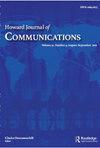健康信念模式审查:在推广该模式以适用于非洲情况时应考虑的建议
IF 0.8
Q3 COMMUNICATION
引用次数: 0
摘要
摘要学者们在健康传播中使用了许多理论和模型,但在行为改变和预测的研究中通常使用的理论和模型很少。其中之一是健康信念模型。尽管该模型已被广泛应用,但在将该模型置于非洲当代应用的背景下所做的工作却不多。由于缺乏由非洲人提出并适用于非洲人的从健康传播角度进行行为预测的理论,因此有必要将现有理论结合起来,以便在非洲的背景下加以应用。本研究旨在揭示已提出的其他结构,以使HBM在非洲大陆的研究背景化。这些关于扩展和附加结构的建议可以提供对学者认为HBM原始版本没有解决的空白的见解。本文回顾了9篇提出或推荐附加结构的文章。审查的结果表明,为了使该模型在非洲的应用具有背景,需要考虑一些关键的附加结构,包括社区影响、文化背景、主观规范、社会支持和环境因素。关键词:非洲社区影响文化背景健康信念模式社会支持披露声明作者未报告潜在的利益冲突。本文章由计算机程序翻译,如有差异,请以英文原文为准。
Health Belief Model Review: Suggestions to Consider in Extending the Model for Application in the African Context
AbstractWhile scholars use many theories and models in health communication, only a handful of them are commonly used in studies focusing on behavior change and prediction. One of these is the Health Belief Model. Even though the model has been applied widely, not much has been done to contextualize the model for contemporary application in Africa. In the absence of a theory by and for Africans that addresses behavior prediction from a health communication viewpoint, there is a need to contextualize the available theories for application in the African context. This study aims to expose additional constructs that have been proposed to contextualize HBM for studies in the continent. Such suggestions for extensions and additional constructs could provide insights into gaps that scholars see as not addressed by the original version of HBM. This essay reviews 9 articles that either proposed or recommended additional constructs. The findings of the review show that to contextualize the model for application in Africa, some of the key additional constructs to consider are community influence, cultural background, subjective norms, social support, and environmental factors.KEYTERMS: Africacommunity influencecultural backgroundhealth belief modelsocial support Disclosure statementNo potential conflict of interest was reported by the author(s).
求助全文
通过发布文献求助,成功后即可免费获取论文全文。
去求助
来源期刊

Howard Journal of Communications
COMMUNICATION-
CiteScore
2.70
自引率
10.00%
发文量
23
期刊介绍:
Culture, ethnicity, and gender influence multicultural organizations, mass media portrayals, interpersonal interaction, development campaigns, and rhetoric. Dealing with these issues, The Howard Journal of Communications, is a quarterly that examines ethnicity, gender, and culture as domestic and international communication concerns. No other scholarly journal focuses exclusively on cultural issues in communication research. Moreover, few communication journals employ such a wide variety of methodologies. Since issues of multiculturalism, multiethnicity and gender often call forth messages from persons who otherwise would be silenced, traditional methods of inquiry are supplemented by post-positivist inquiry to give voice to those who otherwise might not be heard.
 求助内容:
求助内容: 应助结果提醒方式:
应助结果提醒方式:


